It wasn’t until the late 90’s that HBO began to seriously invest in developing original series, but it didn’t take long for some of these shows to catch fire, starting a revolution in the industry that completely transformed the perception of TV in our culture. To that point, TV was considered the most restricted and dumbed-down medium for artists to work in – thanks to HBO, the possibilities of what you could do on TV suddenly felt limitless.
Now, more than 25 years since that revolution began, HBO is no longer the only destination for challenging, high-quality television. However, their library of original content remains unrivaled in its depth of unforgettable shows that left an indelible mark on pop culture. Beyond that, the brand of HBO still carries a certain air of prestige that no other network can hope to match – after all, as the network’s slogan says: “It’s not TV. It’s HBO.”
Of course, with such a diverse roster of shows, it isn’t easy to decide on ten favorites, much less rank them. But as a longtime HBO fan and an obsessive-compulsive person who loves making lists, I’ve decided to do just that. If you’re a newcomer to the world of HBO, this will give you helpful suggestions where to start. And if you’re a longtime viewer like me, hopefully the list will inspire some fun debates trying to answer the ultimate question – which is the greatest HBO series?
Honorable Mention (Best Miniseries)

I decided not to consider miniseries for this top ten list, as it didn’t feel fair to compare single-season shows to ones that ran for multiple seasons. But even if they don’t qualify for this list, HBO has produced its fair share of excellent miniseries that shouldn’t be overlooked, some of which include Mare of Easttown, Sharp Objects, The Night Of, and Chernobyl.
Best of all is Damon Lindelof’s interpretation of Alan Moore’s seminal graphic novel Watchmen, a radical alternate take on the story’s themes that imagines the future of some of its characters while also inventing entirely new characters and plot lines that take place in the same world. Not an adaptation or a straightforward continuation, it’s more like a remix that retains the essential themes of the book and shows how resonant they remain today, even if the issues plaguing our current headlines are a bit different.
The wildly ambitious narrative finds time to include, among other things, the Tulsa race massacre of 1921, the psychological fall out from the giant squid attacks that concluded the novel, a group of white supremacists who wear Rorschach masks, the ever-resilient Adrian Veidt (Jeremy Irons, having a ball) plotting to escape interstellar imprisonment, and a downright brilliant depiction of how the God-like figure Dr. Manhattan experiences time. It’s a borderline sacrilegious idea that absolutely should not have worked, yet it somehow all comes together beautifully.
Top Ten Series
10. The Wire (2002-2008)
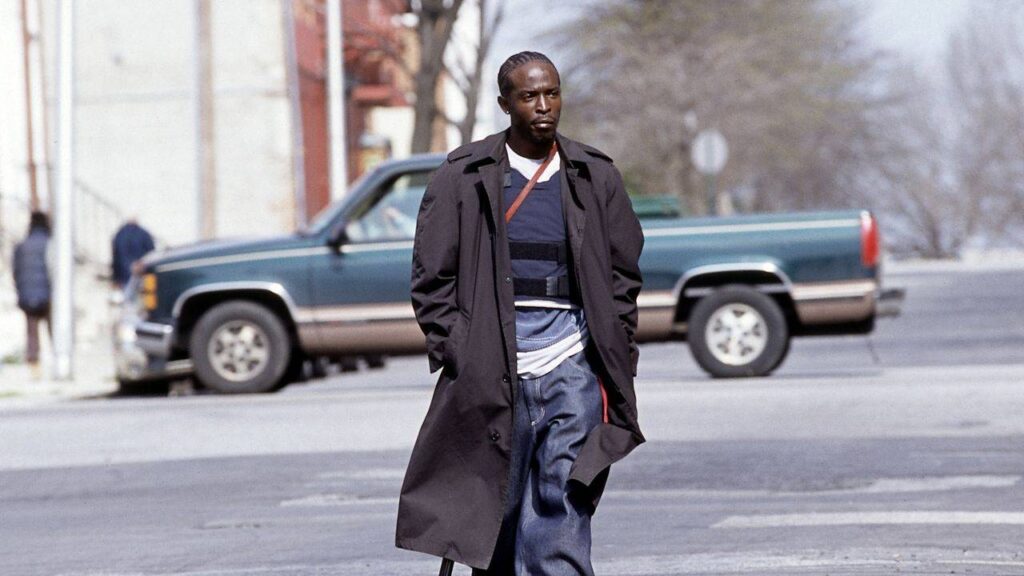
One of the most ambitious and multi-faceted drama series to ever air on television, The Wire is a show unlike any other. Over the course of five seasons, creator David Simon and company delve deep into the city of Baltimore to dissect the problems that lay at the root of virtually every major institution in modern America.
At its best, the show is thought-provoking and heartbreaking in equal measure, showing how our society runs on a self-perpetuating system that’s fundamentally incapable of change. Dividing its time between the law, organized politics, public education, and the media, The Wire argues that even those with the most noble intentions are inevitably ground into dust by the immovable system they all have no choice but to serve. This rare level of thematic depth and searing political commentary is why it’s often cited by critics as the best TV show ever made.
So why is it only number ten on my list? While I appreciate the uniqueness of the structure and thought the series hit some tremendous high points (especially in seasons 3 and 4), I can’t say that it lived up to the hype overall for me. I found the pacing to be almost unbearably slow at times, while some characters and storylines just didn’t interest me at all (the dock workers in season 2, the newsroom in season 5, most of the cop characters throughout the series). As a result, it was somewhat of a slog for me to get through.
However, there are other characters from the show who will undoubtedly stick with me, such as the struggling addict Bubbles (Andre Royo), pragmatic drug dealer Stringer Bell (Idris Elba), and fearless stick-up man Omar Little (Michael K. Williams). Furthermore, as the institutions we depend on continue to crumble around us, the thesis of The Wire rings as loud and true as ever.
9. Succession (2018-2023)
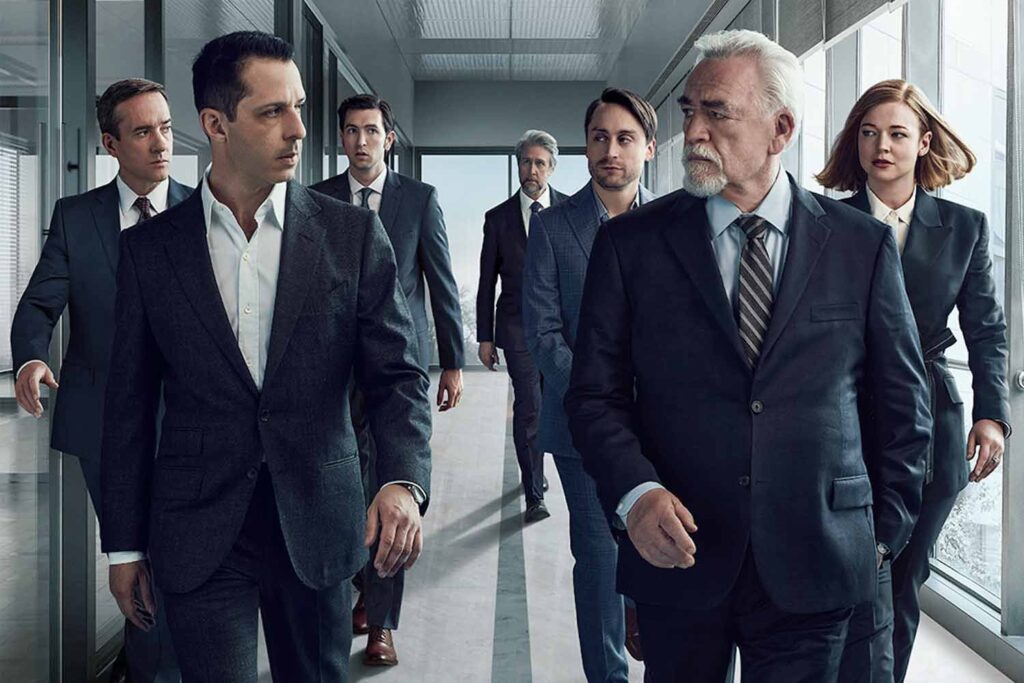
The show that it feels like everyone has been talking about for the last few years, Succession is a timely examination of the corrupting power of wealth and how dangerous it is to let any individuals (i.e. billionaires) possess too much power and influence in our society. The story focuses on Logan Roy (a ferocious, terrifying Brian Cox), the head of a massive media empire who begins to suffer from health problems, leaving the question of which of his children will succeed him.
The problem is all of his kids are emotionally stunted narcissists and Logan himself is not exactly eager to give up the keys to the kingdom, no matter his physical or mental condition. This leads to four seasons’ worth of devious plotting, scheming, and double-crossing, as the egomaniac Kendall (Jeremy Strong), emotionally weak Roman (Kieran Culkin), and ice-cold Shiv (Sarah Snook) all struggle to show their dad that they’re capable of being just as ruthless as he is.
There’s also their half-brother Connor (Alan Ruck), the sibling who no one really pays attention to or takes seriously, even when he decides to run for President. Best of all is the comic dream team of Shiv’s power-hungry, status-obsessed partner Tom (Matthew Macfayden) and the siblings’ cousin Greg (Nicholas Braun), a bumbling fool who proves over time to be just as conniving and morally bankrupt as anyone else in the show.
Considering its depressing themes and loathsome characters, Succession was a very difficult watch for me. There’s an almost sickening feeling when you spend too much time with these people, any one of whom I would be happy to see drive off a cliff in real life. At the same time, the series is so well-written and brilliantly acted that it’s hard to turn off, and its unflinching examination of the failures of capitalism feels like a message that needs to be heard right now.
8. The Deuce (2017-2019)
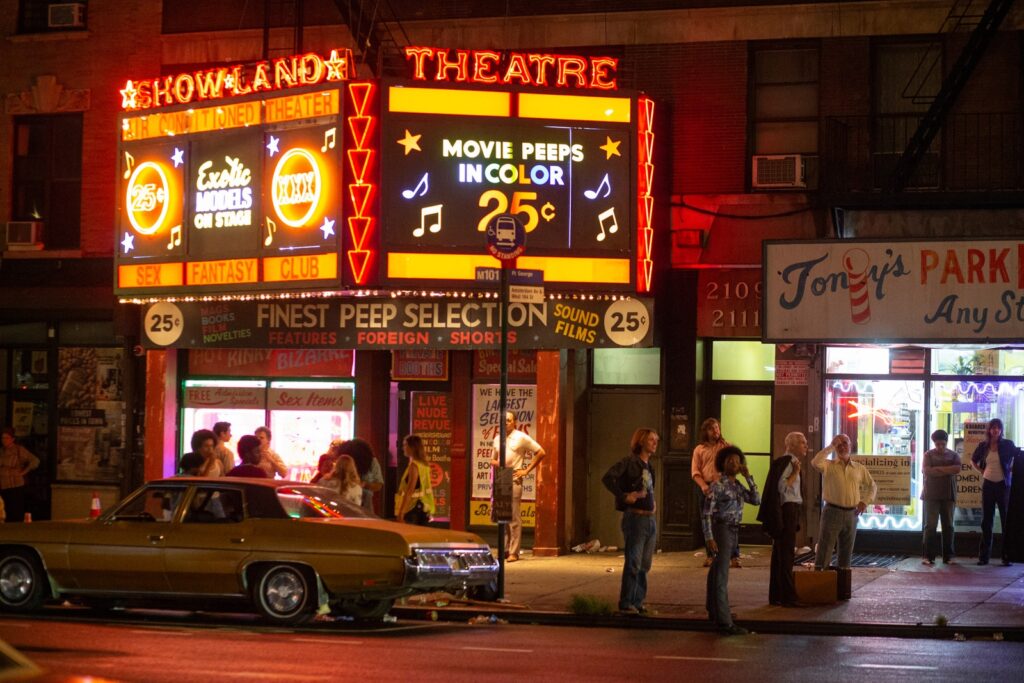
It might seem crazy to place The Deuce, David Simon’s third HBO series, ahead of his first (The Wire) – but this is my list and I’m ranking these shows based solely on how much I enjoyed them. Co-created with George Pelecanos (who wrote many of the best episodes of The Wire), The Deuce is a period piece set in New York City during the ‘70s and ‘80s, depicting the rise of the porn industry and how Times Square transformed from the seedy underbelly of the city to the corporate playground for tourists that it’s become.
Much like The Wire, the story casts a wide net to include all sorts of fascinating characters and show how everything is connected – from the pimps to the prostitutes to the cops to the mafia and even the government. The show features a terrific ensemble cast including James Franco as twin brothers Vincent and Frankie Martino, Maggie Gyllenhaal as street girl turned auteur filmmaker Candy Renee, and Emily Meade as Lori Madison, a naïve girl from Minnesota who falls under the thumb of a ruthless pimp named C.C. (Gary Carr).
This description represents just the tip of the iceberg, as the series is packed with colorful characters and award-worthy performances. It’s also one of the most gorgeously shot and impressively designed shows you’ll ever see, seamlessly immersing the audience in the time period to the point that you’ll feel like you’ve actually been there. With its eye-popping visual style, rich characters, and deeply layered narrative, The Deuce is easily one of the most underrated and affecting dramas in recent memory.
7. The Righteous Gemstones (2019-present)
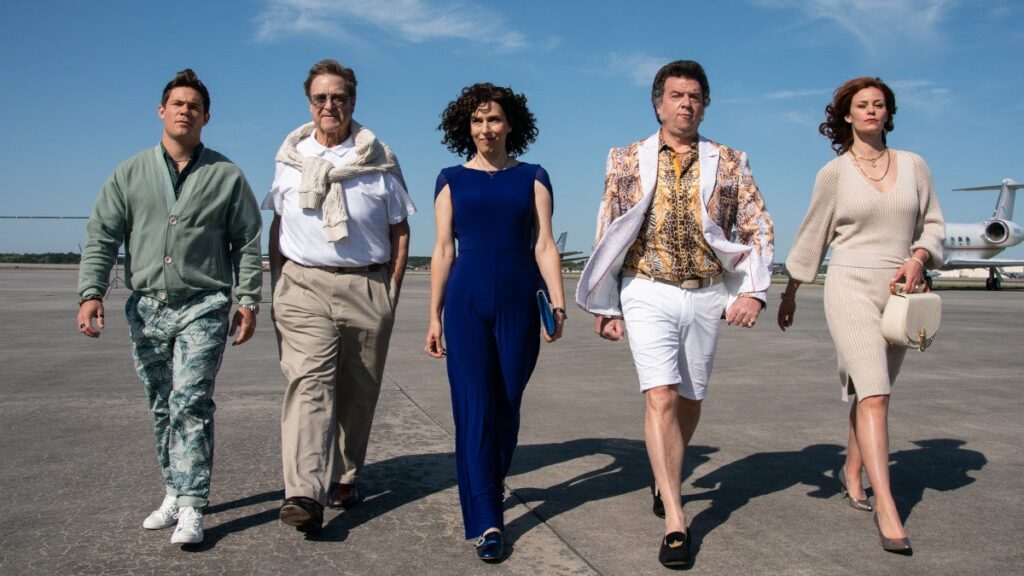
I’m guessing this ranking will seem shockingly high for many readers, but what can I say? I love Danny McBride and his singular style of humor. I enjoyed his first HBO series, Eastbound and Down, though I found it to be inconsistent. After that, he teamed up with Walton Goggins for Vice Principals, a perfectly paced and hysterical series that doesn’t get enough love in my opinion. But The Righteous Gemstones is easily his best work to date, featuring a stacked ensemble cast and impressive sense of scale that elevates it far beyond mere silliness.
The story focuses on the Gemstone family, led by patriarch Eli (John Goodman). He’s frequently appalled by the antics of his three spoiled, incompetent children, played by McBride, Adam Devine, and Edi Patterson. At the same time, he recognizes that he’s getting old and it will soon be time to pass down the reins of the Gemstone family’s lucrative mega church business (yes, there are some obvious thematic parallels to Succession here, but don’t make the mistake of lumping the two shows together – they couldn’t be more different in their approach).
Whether the over-the-top style of The Righteous Gemstones works for you will depend largely on your sense of humor and how much you enjoy the performances of the cast members. McBride, Devine, and Patterson are all comic marvels in their respective roles, while Goodman brings a much-needed sense of gravitas to the material. Best of all is Walton Goggins as Uncle Baby Billy, one of the most riotous characters to ever appear on screen – it’s not an exaggeration to say that Goggins steals every scene he’s in.
The show features even more great characters than the ones mentioned above, and the plot and structure are far more ambitious than you might imagine for a series of this nature. Over the course of its three seasons to date, The Righteous Gemstones has given us eye-opening plot twists, thrilling shootouts and car chases, toe-tapping musical numbers, and more. It’s about as close to a cartoon as a live-action show can get and will inevitably turn some viewers off with its crudeness. But if you can get on McBride’s wavelength, this is the funniest show on TV right now.
6. Veep (2012-2019)
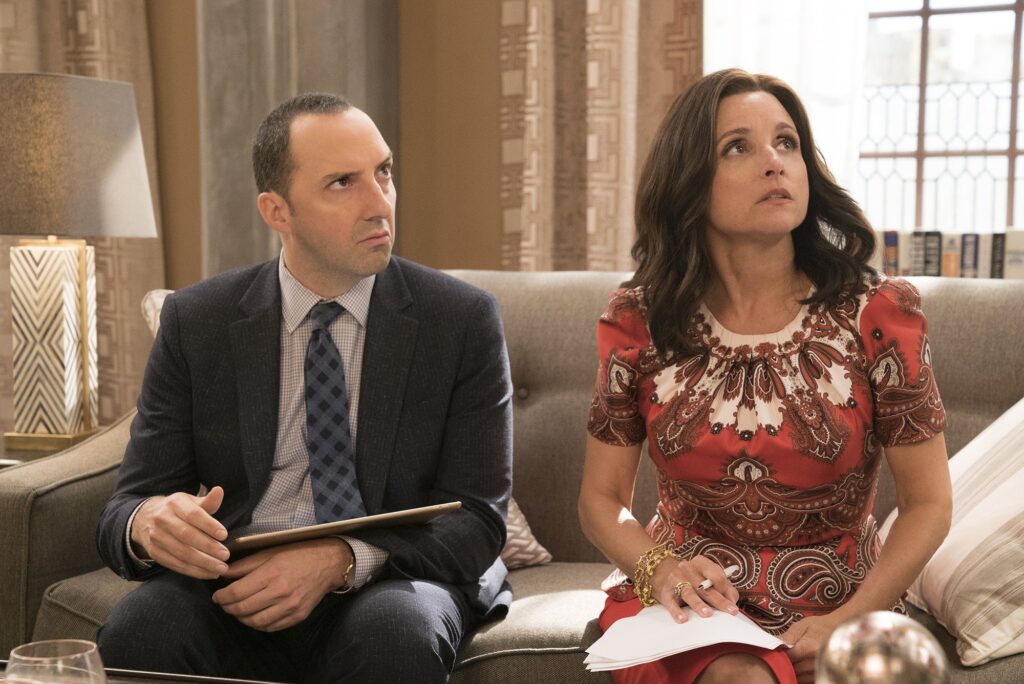
A clueless, self-centered, toxic politician rising all the way to The White House seemed like an absurd concept when Veep debuted in 2012. Just four years later, Donald Trump was in office, making it seem like this show had predicted our future. In hindsight, none of us should’ve been as surprised as we were – the whole point of this show is that people who have no business being in charge of anything can and frequently do rise to power in American politics. And barring huge structural changes to our political process, they will continue to do so.
This may sound like a bummer, but Veep is an absolute blast to watch. Focusing on incompetent Vice President Selina Meyer (Julia Louis-Dreyfus) and her devoted staff, the show is a razor-sharp satire packed with unforgettable performances and some of the most hysterical one-liners you’ll ever hear. It also moves at a breakneck pace, never slowing down throughout its seven-season run while finding time to skewer just about every aspect imaginable of contemporary politics.
Louis-Dreyfus feels like she was born to play Selina Meyer and it’s no surprise that she won six consecutive Emmys for the role. However, it’s the supporting cast that really makes this series shine for me, including Selina’s extremely loyal assistant Gary (Tony Hale), her shockingly lazy communications director Mike (Matt Walsh), savant-like campaign aide Richard (Sam Richardson), and delusional White House liaison Jonah Ryan (Timothy Simons).
All of these characters and more cement Veep as a classic comedy series that’s unlikely to lose any of its bite over time, as our political leaders seem hell-bent on proving they can make the real world just as ridiculous as anything on TV.
5. Oz (1997-2003)
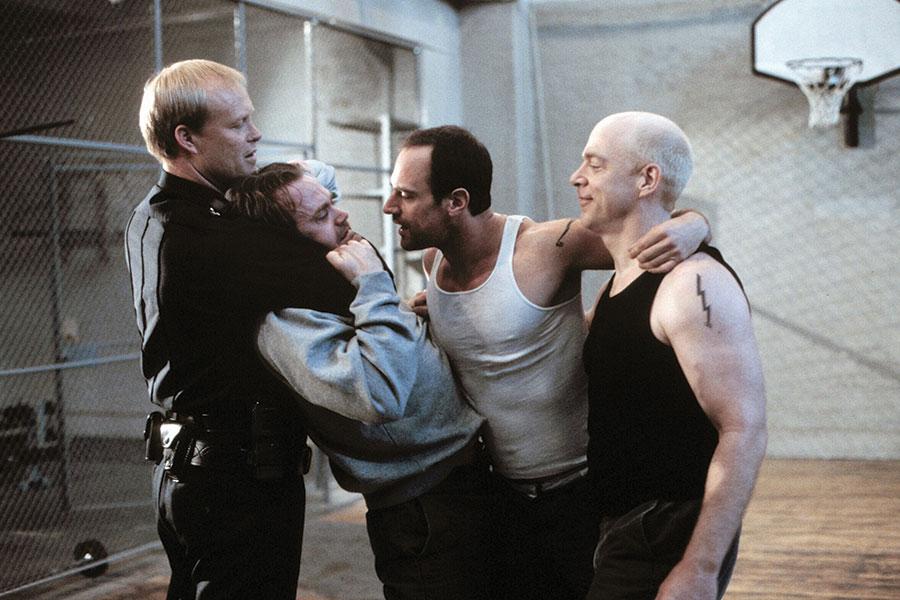
When people talk about the rise of HBO, they tend to cite The Sopranos or Sex and the City as the series that started it all. But even before those shows, there was Oz, the very first original drama series produced by HBO. Premiering in 1997, Oz was downright shocking in its gritty, unrestrained depiction of life in American prisons, featuring scenes of graphic violence and sexual content unlike anything seen on television to that point.
Even by today’s standards, the show is a brutal watch, with its pilot episode alone featuring a major character getting burned to death and another one being dominated into submission by a white supremacist who ultimately brands him with a swastika. But don’t make the mistake of dismissing Oz as cheap exploitation – this is a sophisticated piece of dramatic storytelling, using the prison system to explore societal issues including addiction, healthcare, racism, homophobia, religious extremism, and much more.
The show takes place in a fictional prison called Oswald Correctional Facility, with most of the action occurring in an experimental unit called Emerald City. The cast is as large and diverse a group as you’ll ever see on TV, with standouts including the radical Islamist activist Kareem Said (Eamonn Walker), swaggering sociopath Simon Adebisi (Adewale Akinnuoye-Agbaje), vicious Nazi leader Vern Schillinger (J.K. Simmons), and wheelchair-bound inmate Augustus Hill (Harold Perrineau, who also narrates the show and provides thematic context for the audience).
Perhaps most important of all is Tobias Beecher (Lee Tergesen), a mild-mannered attorney who winds up in Oz after killing a young girl while driving drunk. Watching what Beecher goes through and how he’s forced to transform in order to survive within this world will make you question how sending someone to prison could ever possibly make them a better person.
This only scratches the surface of the many fascinating characters and heartbreaking stories that unfold inside Oz over the course of six seasons. The show arguably ran a bit too long, with the quality showing signs of decline towards the end, but it still concluded on a solid note. And even with the occasional narrative stumble, the show never failed to be riveting and emotionally devastating. By the time you get to the end, you’ll feel like you’ve been locked up alongside these characters and suffering with them, struggling to remember the last time you felt the warmth of the sun.
4. Boardwalk Empire (2010-2014)
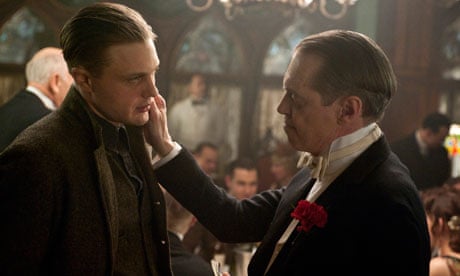
For whatever reason, Boardwalk Empire is rarely talked about as one of HBO’s finest achievements. I’m not sure why, as it’s got everything you could want in a drama series: unforgettable characters, terrific writing, expansive world-building, constant conflict, and to top it all off, an immersive period setting rendered in stunning technical detail. Sure it moves at a methodical pace, but the series consistently rewards your patience by ensuring the details add up in surprising and satisfying ways, all the way up to a series finale that feels poetic and perfect in the way it brings the narrative full-circle.
The story takes place in Atlantic City in the 1920s, during the height of Prohibition. Treasurer Nucky Thompson (a brilliant Steve Buscemi) is one of many people in power using the demand for illegal booze to make himself a fortune. The scope of the series seems to be forever expanding, casting a wide net to include politicians, gangsters, prohibition agents, and more. It’s a world where everything is connected and no one is innocent, not even Nucky’s progressive-minded wife Margaret (Kelly Macdonald).
The cast is impeccable, a dream team of veteran actors given the chance to run with wonderfully-written, complex roles. Just a few of the many great characters who populate the world of the show include African-American kingpin Chalky White (played with incomparable swagger by Michael K. Williams), brutally disfigured ex-soldier Richard Harrow (a soulful Jack Huston), and humorless Prohibition agent turned criminal Nelson Van Alden (Michael Shannon in the performance of a lifetime). The story also makes room for real historical figures like Arnold Rothstein (Michael Stuhlbarg) and Al Capone (Stephen Graham).
With its expensive set design and mesmerizing cinematic style (Martin Scorsese directed the pilot), Boardwalk Empire might be the most gorgeous show to ever air on television. Few, if any shows, can boast the kind of immersive atmosphere and technical craftsmanship on display here. Combined with the top-notch performances and consistently excellent writing, it’s easily one of my favorite drama series that I’ve watched and among HBO’s crown jewels.
3. Barry (2018-2023)
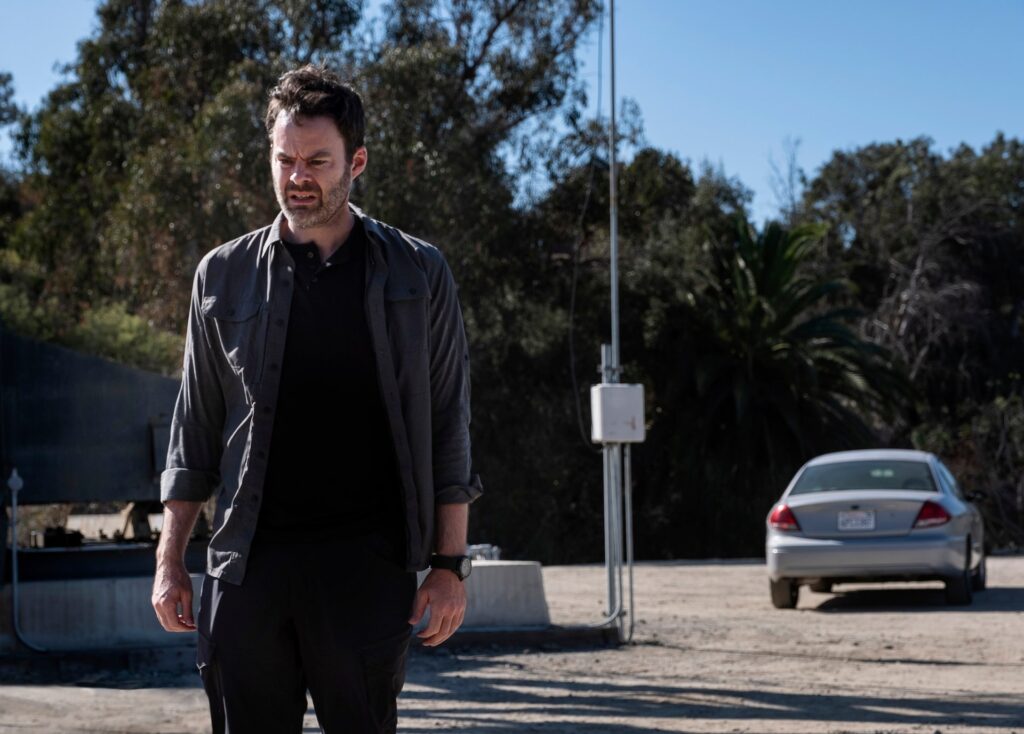
When Barry debuted in 2018, I found myself in almost immediate awe of it, recommending it to anyone I talked to. With its unique tone of outrageous, borderline Looney Tunes-esque comedy that can erupt into genuinely disturbing violence at a moment’s notice, it’s certainly not a show for everyone. But if you have a dark (really dark) sense of humor, you might find yourself tearing up from laughing so hard – and eventually, as the characters make poor choices and unravel into despair, the tears will come back for very different reasons.
Barry Berkman (Bill Hader in a tour-de-force performance) is a former U.S Marine who now uses his military skills to work as a professional hitman, carrying out dangerous assignments for his mentor and father figure Monroe Fuches (a despicably hilarious Stephen Root). While tracking a target, Barry accidentally stumbles into an acting class led by pompous teacher Gene Cousineau (Henry Winkler, never better) where he quickly becomes smitten with one of the students, Sally Reed (a terrific Sarah Goldberg).
Complications continue to stack up from here, as Barry’s desperate attempt to reinvent himself as an actor and win Sally’s affection creates dangerous ripples that affect the lives of everyone around him, many of whom are innocent. The premise of the series starts as something that sounds like a bad sketch idea (what if a hitman became an actor?) and evolves into a thought-provoking examination of whether human beings are really capable of changing their true nature.
Yet for all the weighty subject matter, Barry is also a show that gives plenty of screentime to a gay albino Chechen mobster named NoHo Hank (a hysterical Anthony Carrigan), one of the most absurd and ridiculous characters to ever appear on television. A show that veers between biting Hollywood satire, goofy slapstick comedy, and emotionally traumatizing violence shouldn’t work – but somehow, thanks to the singular vision of Hader and his collaborators, the show never falls apart.
It also moves at a blistering pace, with a total of just thirty-two half-hour episodes, ensuring the story and characters never have time to grow stale. After a roller-coaster ride of murders, betrayals, identity changes, and more, it all culminates in a stunner of an ending that left me thinking about it for days.
2. Deadwood (2004-2006)
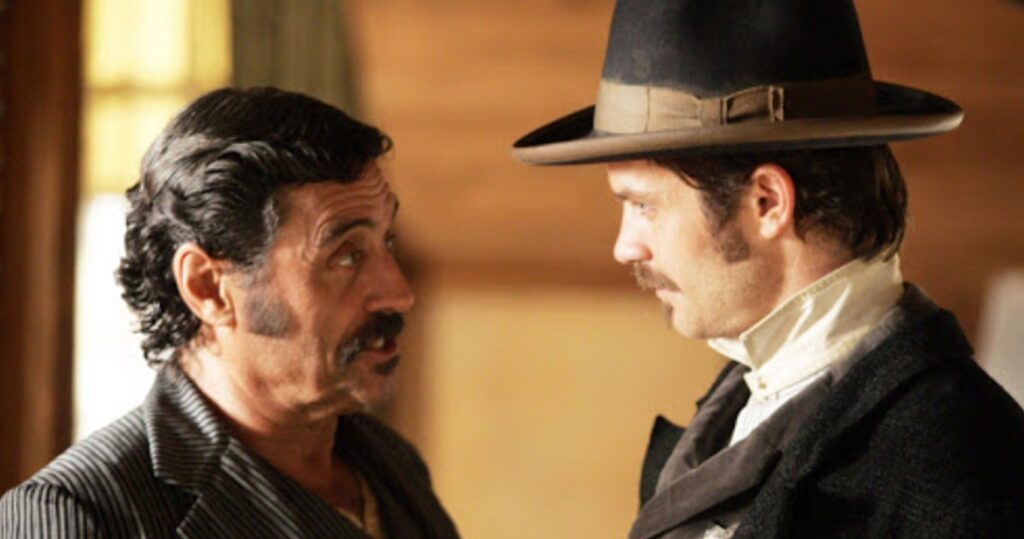
“Every fuckin’ beatin’ I’m grateful for. Every fuckin’ one of them. Get all the trust beat outa you. And you know what the fuckin’ world is.” – Al Swearengen
“Every day takes figuring out all over again how to fuckin’ live.” – Calamity Jane
“Announcing your plans is a good way to hear God laugh.” – Al Swearengen
These are just a few short examples of the endlessly quotable dialogue in Deadwood, a show that will surely never be topped in the richness and inventiveness of its language, not to mention its gleeful profanity. As written by David Milch, the characters in Deadwood never stop talking and rarely feel the need to resort to physical violence, when a perfectly-worded insult can achieve the same effect.
Despite taking place in the old west, you can count the noteworthy brawls and shootouts in the series on one hand – this is not a show you watch for action, or plot for that matter. The joy of Deadwood is simply basking in its primitive world and savoring your time with its deeply flawed but lovable characters, brought to life by a brilliant ensemble cast in which nearly every member gives the best performance of his or her career.
This is especially true of Ian McShane, who tears into the role of saloon owner Al Swearengen with the gusto of an actor who knows he’s stumbled into a once-in-a-lifetime role. But there are many more classic characters and performances on display here, from Timothy Olyphant as temperamental sheriff Seth Bullock to the great Powers Boothe as Swearengen’s rival Cy Tolliver. I could keep listing characters and raving about the cast all day, but we’d never reach the end of this article.
So what is Deadwood really about? It’s about a town of disparate outsiders (prospectors, criminals, prostitutes, etc.) coming together against all odds to form a functioning community, all while fighting against the inevitable hostile takeover of big capital (embodied to loathsome perfection by Gerald Mcraney’s George Hearst). It’s a story that finds nuggets of beauty and human kindness in an ugly world that’s ruled by greed.
The show was left criminally unfinished when HBO canceled it after season 3, but thanks to demand from the fans, we finally got a movie to wrap things up in 2019, nearly 15 years after the original series ended. While it should never have taken that long, most viewers will agree it was worth the wait.
1. The Sopranos (1999-2007)
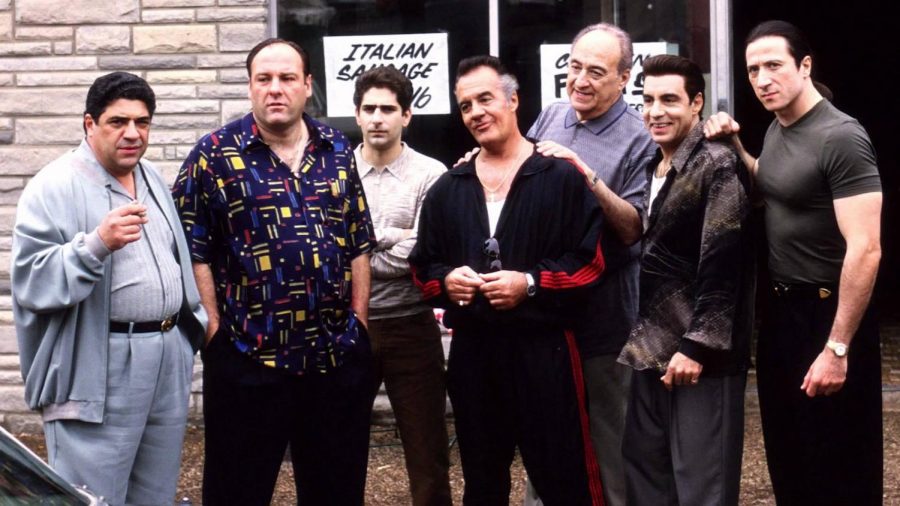
What is there left to say about The Sopranos? If you haven’t watched it yet, you undoubtedly have encountered many people in your life already who have told you it’s the greatest show of all time and you really need to watch it. And you may be skeptical, or turned off by the length of the series, but they’re absolutely right. The Sopranos is the rare pop culture phenomenon that lives up to the hype, a universally praised work of art that deserves every accolade it’s received and maybe more.
So what makes it so great? Start with the characters, led by James Gandolfini as Tony Soprano in arguably the single greatest performance in TV history. Tony’s a husband and father, making tons of money and living a cushy suburban lifestyle while secretly wondering what the point of it all is and why none of the luxuries he’s achieved in life seem to bring him any happiness. This is a condition at the heart of modern life that will make him instantly relatable to most viewers.
The thing is, Tony is also a mob boss, a sociopathic criminal who takes whatever he wants and doesn’t hesitate to kill whoever stands in his way. And he also has to deal with his nagging mother (a hilarious Nancy Marchand) and cranky uncle Junior (an exceptional Dominic Chianese), who may or may not be in cahoots to have Tony whacked.
Furthermore, his relationship with his wife Carmela (Edie Falco in another all-timer performance) seems to grow more and more strained by the day. With all this going on, it’s no wonder he starts having panic attacks that land him in therapy with the ever-patient Dr. Melfi (Lorraine Bracco, bringing a touch of mob movie royalty).
What I’ve described so far is basically just the events that kick off season 1. I would need a whole book to talk about the endless plotlines, characters, and themes that emerge over the course of eighty-six episodes. Hell, I could write a whole article just about the side-splitting antics of Tony’s nephew Christopher (a sensational Michael Imperioli) and veteran crew member Paulie Walnuts (an unforgettable Tony Sirico). As the series evolves, characters and stories come and go, but the world of the show is so vast and vividly realized that you feel like it could just keep on going forever.
It doesn’t, of course – by now, it’s no spoiler to talk about the ending, possibly the most endlessly discussed and debated conclusion to a series ever. While many were infuriated by the sudden cut to black, leaving the fate of Tony and his loved ones in a permanent state of mystery, I was profoundly moved by the ending. It’s surprising, it’s impossible to predict, it avoids easy resolution or definitive closure, and it forcefully snaps you out of the world of the show back to reality, forcing you to start thinking about your own life and the choices you’ve made.
Something may have happened in that diner, or nothing may have happened – Tony could be dead facedown on the table, or he could simply be enjoying a basket of onion rings with his family. Either way, the point is that life is precious and we should enjoy every moment of it that we can because at any second, without warning, it could all be taken away from us.
